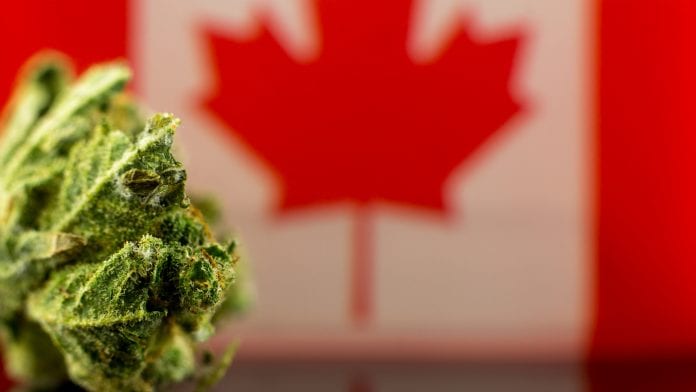
A new survey has demonstrated barriers in the legal medical cannabis system that are forcing patients to self-medicate without the support of a healthcare professional.
Medical Cannabis Canada (MCC) has published the results of its first Medical Cannabis Patient Survey (MCPS), which found that systemic barriers in the legal medical cannabis system are pushing patients to unregulated and recreational markets without the support of a healthcare professional.
The results show that policy change is needed to reduce costs and expand access points to the medical market in order to improve care.
Medical cannabis in Canada
In Canada, cannabis can be legally accessed recreationally or medically. The medical system requires a ‘medical document’ (similar to a prescription) from a healthcare practitioner. The MCPS found that only one in three (37%) of Canadians using cannabis for medical purposes have a medical document. Patients without a medical document, report substantially less engagement with healthcare professionals and more report use of unregulated markets to access their treatment.
The MCPS reports that 74% of those who have had a medical document go to a healthcare practitioner or a pharmacist for guidance on cannabis use for medical purposes, compared to just 24% of those who have never had a medical document. This confirms that most patients are self-medicating without expert support.
“It is essential for Canadians to have access to support from healthcare professionals to help them navigate medical cannabis safely and effectively. Unfortunately, there is little incentive to access a medical document or use the legal medical channel and many are being left to manage their treatment alone,” says Max Monahan-Ellison, Medical Cannabis Canada Board Member and MCPS Project Lead.
The majority of patients who have never had a medical document report are going to friends and family, websites, and retail salespeople or ‘budtenders’ at recreational cannabis stores for medical guidance. Only a small proportion of these patients have spoken to a healthcare practitioner about potential drug interactions with cannabis.
Medical cannabis stigma
Most patients (83%) feel there is stigma among traditional medical practitioners surrounding medical cannabis use and 57% struggle to find a healthcare practitioner to speak to about getting a medical document. What is more, 60% say they feel like they have to access medical cannabis from the unregulated market because the regulated system poses too many challenges, including cost, barriers to obtaining a medical document, and difficulty navigating the structure.
Cost was seen as the biggest barrier pushing patients to abandon the medical cannabis system and is the main reason patients switch sources. In the past year, most patients reported using the recreational market to access their treatment, 24% from an unregulated dispensary and 33% informally through a friend, family, acquaintance, or dealer. These unregulated sources were perceived as more affordable than accessing medical cannabis through legal channels for purchase.
These barriers can have negative impacts on patients. While one in four reported that increased medical cannabis use decreased reliance on opioid pain relievers, 36% of these patients reported that barriers to accessing medical cannabis led them to return to opioid medications.
“As the Cannabis Act comes up for review in 2021, collaborative efforts are needed by the industry, non-profits and regulators to ensure patients can access their treatment and healthcare professional support,” adds Monahan-Ellison.
Two key areas need to be addressed:
- Expanding access points to medical cannabis through pharmacy distribution, in addition to existing mail delivery options: Around 90% of patients say they are supportive of pharmacists being able to issue medical documents, dispense medical cannabis, and provide medical guidance on cannabis use and risk, with one in three saying that being able to access to this guidance would encourage them to speak to a healthcare practitioner.
- Improving affordability, with a focus on eliminating excise duty, Harmonized Sales Tax/Goods and Services Tax (HST/GST) and Provincial Sales Tax (PST) (in applicable provinces) and pushing for the expansion of benefits coverage: Over 90% of patients say they are supportive of the elimination of taxes on medical cannabis, with nearly 60% saying they think this would reduce the costs of their treatment and around a quarter saying it would reduce their use of the unregulated market.
Medical Cannabis Canada would like to thank Spectrum Therapeutics, the medical division of Canopy Growth Corporation for making this important project possible through an arms-length unrestricted grant to MCC.
“As a volunteer run organisation, unrestricted, arms-length grant support like this is essential to empower us to execute bigger projects that allow us to advocate for and support patients further,” says Gerald Major, MCC Board Chairperson. “We also want to thank the patient volunteers who reviewed and provided input on the development of the survey.”
Visit Patientaccess.ca/survey to download the results report.








The Cannabis Act seems more fixated on protecting the potential profits generated by the expanding, Government sponsored, Recreational Cannabis Industry, which is currently attempting to monopolise ALL Cannabis genetics, production, distribution, and retail in Canada out of sheer corporate greed.
Rather than attempting to promote LONG OVERDUE RESEARCH into the many medicinal benefits that Full Complex Cannabinoid Therapy could provide to a large segment of the Canadian population, our government has chosen to protect a monopolistic Canadian Cannabis Cartel that seeks to control ALL cannabis production and genetics in Canada.
A great read undoubtedly! I agree that cannabis must be used safely and effectively. Otherwise, it won’t be of any good.
Medical cannabis is useful for people who seek help from torment and different indications without the mind-altering effects of cannabis or certain drugs. Useful information shared. I am very happy to read this article. thanks for giving us nice info.